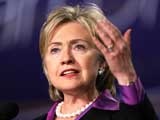|
|
TODAY.AZ / World news
Clinton combines diplomacy with pressure on Iran
27 February 2010 [14:45] - TODAY.AZ
The US administration says while keeping pressure on Tehran it still remains committed to a "diplomatic" resolution of the Iranian nuclear issue.
 "We remain committed to a diplomatic peaceful resolution [of the Iranian nuclear issue]," US Secretary of State Hillary Clinton told reporters on Friday.
"We remain committed to a diplomatic peaceful resolution [of the Iranian nuclear issue]," US Secretary of State Hillary Clinton told reporters on Friday.The former first lady claimed that Iran was abdicating its nuclear responsibilities and hence the US had to increase pressure on Iran to change its behavior.
"Iran is not living up to its responsibilities and we are working with partners in the international community to increase pressure on Iran to change course."
This is while Iran rejects the allegations of non-cooperation, saying that it has been cooperating with the IAEA beyond its legal obligations.
The UN nuclear watchdog has carried out the highest number of inspections in its history on Iran's nuclear energy program and has also found nothing to indicate that the program has diverted toward weaponization.
On February 18, the new International Atomic Energy Agency (IAEA) chief, Yukiya Amano, issued a report about Iran's nuclear program.
Amano, in his first report on Iran's nuclear activities on February 18, once again verified the non-diversion of declared nuclear material in Iran but called on Tehran to further discuss and cooperate on the issue of the alleged studies.
The issue of alleged studies purportedly implicate Iran in pursuing a "green salt project, high explosives testing, and a missile re-entry vehicle project."
Iran reacted to the report, saying that, despite confirming the non-diversion of the country's nuclear work, the report failed to mention Iran's "explanations" regarding the 'alleged studies' and hence was "unbalanced."
In an IAEA meeting on Wednesday, Iran's ambassador to the agency, Ali Asghar Soltanieh, said Iran has only viewed the so-called evidence on the alleged studies in the form of "power point documents" and had found it lacking in credibility.
According to Soltanieh, Iran then provided a 117-page report and attended several meetings explaining why it called the document fabricated while the recent IAEA report suggested that Tehran had rejected the allegations without being cooperative enough with the IAEA.
He said that the new report should have mentioned that the issue of the alleged studies had not been authenticated, as confirmed by former IAEA head Mohamed ElBaradei, and that the so-called evidence on them did not bear any classified stamps, as confidential documents usually do.
/Press TV/
URL: http://www.today.az/news/regions/62743.html
 Print version
Print version
Views: 2131
Connect with us. Get latest news and updates.
See Also
- 23 September 2025 [14:39]
Pashinyan challenges former Armenian presidents to public debate over war accusations - 23 September 2025 [09:00]
S Korea, Saudi Arabia discuss expanding arms cooperation - 23 September 2025 [08:00]
Germany plans for 1,000 wounded troops per day in case of conflict with Russia - 22 September 2025 [09:00]
Over 1.1 million Italians suffer from Alzheimer’s - 22 September 2025 [08:00]
South Korea pays $3.3 billion in U.S. tariffs, sixth-highest worldwide - 21 September 2025 [23:30]
Trump announces first face-to-face with Xi since 2019 at APEC - 21 September 2025 [23:00]
Chinese energy tech firm launches automated system for unconventional oil and gas extraction - 21 September 2025 [22:30]
Saudi Arabia pledges nearly $368M to Yemen's government amid deepening crisis - 21 September 2025 [20:15]
Heavy rains trigger landslides in Turkiye’s Black Sea region - 21 September 2025 [19:10]
Russia debuts 'Intervision' international song contest as Eurovision alternative
Most Popular
 President Ilham Aliyev congratulates President of Malta
President Ilham Aliyev congratulates President of Malta
 Chinese Air Force unveils J-35A and J-20 fighters at 2025 aviation open day
Chinese Air Force unveils J-35A and J-20 fighters at 2025 aviation open day
 Media tour highlights Khankendi ahead of state sovereignty day
Media tour highlights Khankendi ahead of state sovereignty day
 President Ilham Aliyev addresses participants of international conference
President Ilham Aliyev addresses participants of international conference
 Israel completes world’s first combat-ready laser air defense system
Israel completes world’s first combat-ready laser air defense system
 President of Rwanda concludes official visit to Azerbaijan
President of Rwanda concludes official visit to Azerbaijan
 Baku set to crown Formula 1 Azerbaijan Grand Prix winner today
Baku set to crown Formula 1 Azerbaijan Grand Prix winner today
